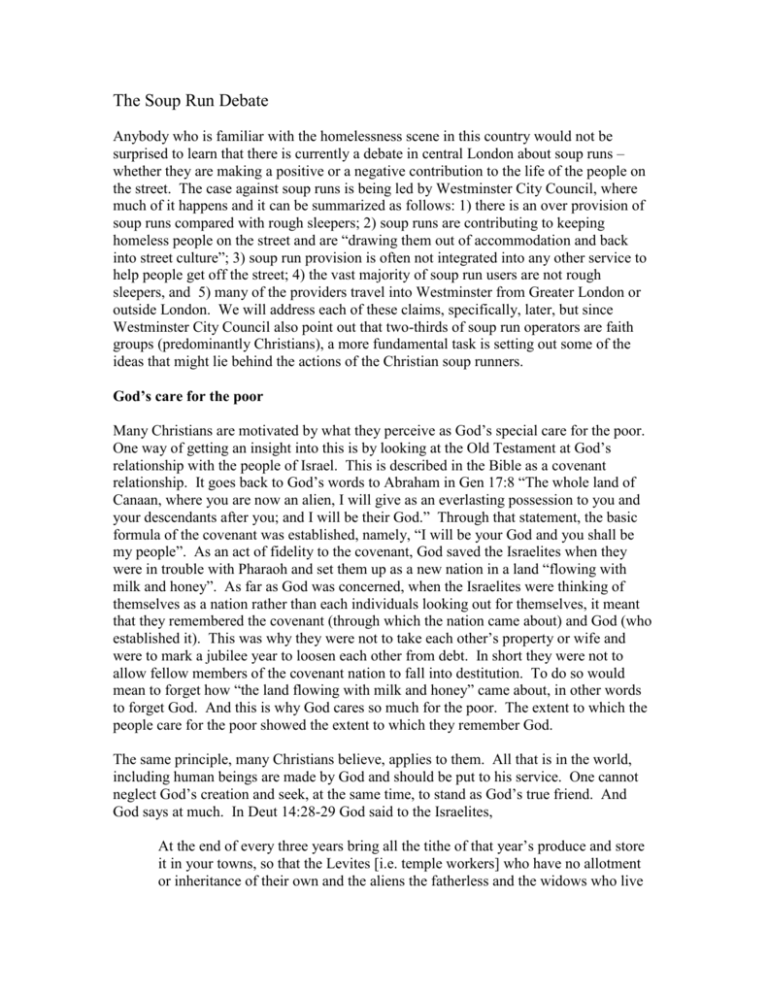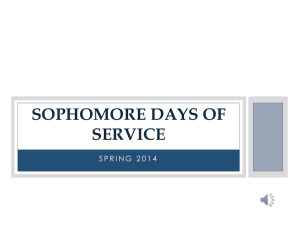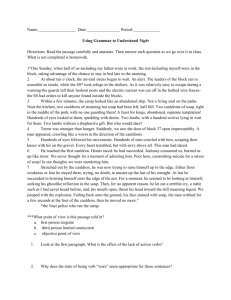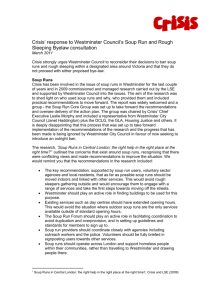Article by Chigor Chike from Housing Justice UNLEASH newsletter
advertisement

The Soup Run Debate Anybody who is familiar with the homelessness scene in this country would not be surprised to learn that there is currently a debate in central London about soup runs – whether they are making a positive or a negative contribution to the life of the people on the street. The case against soup runs is being led by Westminster City Council, where much of it happens and it can be summarized as follows: 1) there is an over provision of soup runs compared with rough sleepers; 2) soup runs are contributing to keeping homeless people on the street and are “drawing them out of accommodation and back into street culture”; 3) soup run provision is often not integrated into any other service to help people get off the street; 4) the vast majority of soup run users are not rough sleepers, and 5) many of the providers travel into Westminster from Greater London or outside London. We will address each of these claims, specifically, later, but since Westminster City Council also point out that two-thirds of soup run operators are faith groups (predominantly Christians), a more fundamental task is setting out some of the ideas that might lie behind the actions of the Christian soup runners. God’s care for the poor Many Christians are motivated by what they perceive as God’s special care for the poor. One way of getting an insight into this is by looking at the Old Testament at God’s relationship with the people of Israel. This is described in the Bible as a covenant relationship. It goes back to God’s words to Abraham in Gen 17:8 “The whole land of Canaan, where you are now an alien, I will give as an everlasting possession to you and your descendants after you; and I will be their God.” Through that statement, the basic formula of the covenant was established, namely, “I will be your God and you shall be my people”. As an act of fidelity to the covenant, God saved the Israelites when they were in trouble with Pharaoh and set them up as a new nation in a land “flowing with milk and honey”. As far as God was concerned, when the Israelites were thinking of themselves as a nation rather than each individuals looking out for themselves, it meant that they remembered the covenant (through which the nation came about) and God (who established it). This was why they were not to take each other’s property or wife and were to mark a jubilee year to loosen each other from debt. In short they were not to allow fellow members of the covenant nation to fall into destitution. To do so would mean to forget how “the land flowing with milk and honey” came about, in other words to forget God. And this is why God cares so much for the poor. The extent to which the people care for the poor showed the extent to which they remember God. The same principle, many Christians believe, applies to them. All that is in the world, including human beings are made by God and should be put to his service. One cannot neglect God’s creation and seek, at the same time, to stand as God’s true friend. And God says at much. In Deut 14:28-29 God said to the Israelites, At the end of every three years bring all the tithe of that year’s produce and store it in your towns, so that the Levites [i.e. temple workers] who have no allotment or inheritance of their own and the aliens the fatherless and the widows who live in your towns may come and eat and be satisfied, and so the Lord your God may bless you in all the work of your hands The key point here is that tithe (the portion of one’s earning given back to God) is to be used to feed the temple workers and the poor of the land. In other words, just as with temple workers, what is given to the poor is in effect given back to God. A similar point is made in the New Testament in the Parable of the Sheep and the Goats (Matt 25:31ff). in which Jesus says, “whatever you did for them, you did for me.” It is for this reason that many Christian thinkers have rejected any suggestion of a dichotomy between the personal and the social aspects of faith. For example, Kenneth Leech, who worked with the homeless in London for many years, stated that “authentic piety must have major social consequences.” God’s overflowing love Another important idea that might be at the back of the mind of many of the Christians involved is the “overflowing” nature of God’s love. This has been variously described as “God’s gratuitousness” and “the freedom of God’s love”. One way of putting it is that God does not play by our rules of cause and effect or even our rule of fairness. This is somewhat captured by the Parable of the Workers in the Vineyard (Matt 20:1-16), where a landowner hired workers for his vineyard at different times of the day and at the end paid all of them a full day’s wage. When those who were hired first complained, the landowner said to them, “Didn’t you agree to work for a Denarius…Don’t I have the right to do what I want with my own money. Or are you envious because I am generous.” Many Christians who have experienced this generosity, personally, through being saved from sin or difficult personal circumstances find themselves propelled by their experience to seek to help other people. It is as the song goes: Were the whole realm of nature mine That were an offering far too small. Love so amazing, so divine Demands my soul, my life, my all. However, in a world where human behaviour is studied as “science” and “waste” is the most hideous dragon that must be slain, Christians who love with abandon appear odd. But this kind of “wasteful” love is demanded by God. In Lev 19:9 God directs the Israelites: When you reap the harvest of your land, do not reap to the very edges of your field or gather the gleanings of your harvest. Do not go over your vineyard a second time or pick up the grapes that have fallen. Leave them for the poor and the alien. I am the Lord your God. Better to risk some waste, than let your fellows die of want. The specific points raised It is noticeable that attitudes towards rough sleepers and homeless people have been hardening in recent years. Kenneth Leech, in a recent article entitled “The Changing Pattern in Homelessness” traces some of this hardening of attitude to the New Labour Government. Although the Government is taking some measures to tackle the issue of homelessness, it is also, on the other hand, adopting a less tolerant attitude to homeless people themselves. As a result there is in this whole area an “unpleasant and oppressive attitude”. Increasingly, rough sleepers are seen by the authorities as representing all homeless people, so focusing on them (even though they are only a small proportion of the homeless) can give an impression about what is being achieved on all forms of homelessness. Leech believes that some of this, including the greater preparedness to use enforcement against rough sleepers, is being copied from North America, where the strategy has, in fact, failed. This is the trend WCC and their supporters seem to be following. There is an unwillingness to recognize the complex nature of homelessness – the fact that often there are issues of alcoholism, drug abuse, mental health, redundancies, migration patterns, availability of affordable housing and so on. For example, WCC’s own mapping project* states that: A8 nationals are the major proportion of soup run users in Victoria. This group has no entitlement to benefits and cannot be assisted by the outreach teams. Therefore the traditional argument against soup run (keeping people on the street, enticing people back) don’t hold such weight in relation to this group Yet the Council constantly repeats this claim regarding the effect of soup runs. In a similar way, the issue of overprovision can be exaggerated. It has been often said that there are 65 soup runs in central London, but it is rarely pointed out that this figure includes groups who do it only occasionally, such as once a month. It is difficult to know what to make of WCC’s complaint that many of those who use the soup runs are not rough sleepers. If the issue here is that these other people do not deserve this help, then one is simply reminded of the Parable of the Workers in the Vineyard. And the soup run provider can simply repeat the words of the vineyard owner, “Don’t I have the right to do what I want with my own money. Or are you envious because I am generous?” There is nothing either in law or within Christianity which says that soup runs are meant for rough sleepers. Rough sleepers get the help because they are poor and in need, and many soup runners might well feel that anybody who is poor and in need are welcome. The retort – “we will feed taxi drivers if they want” – by the Hindu soup run group when confronted with this issue by the WCC Mapping project shows that this way of thinking is not restricted to Christianity Another complaint is that many of the providers travel into Westminster from Greater London or outside London. Jeremy Swain of Thames Reach Bondway, one of the key supporters of the WCC approach makes this point: We talk to people at soup runs who have walked miles into central London, often intending to stay the night on the street rather than returning home. Often they are receiving help from volunteers who have also traveled great distances Swain’s point is that this is incredulous. But this incredulity is itself surprising. Westminster City Council in its website describes Westminster as “the heart of the Capital”. It is the hub for all manner of human activities in London; a huge number of businesses, shoppers, a ceaseless stream of tourists, the hub of national political activities with the presence of the Palace of Westminster and so on. Why should it surprise that the homeless and those who serve them use it as a meeting point? Also, one does not hear Westminster City Council (or one of their supporters) complain about these other people it attracts. Indeed, quite the opposite. In its website, it invites people to come to Westminster and “savour the energy, vibrancy and diversity of London” and to “make a visit to Piccadilly Circus and Leicester Square” since this is “an essential part of your London experience”. The fact is that just as Piccadilly Circus and Leicester Square attracts visitors and businesses they also attract the homeless and their carers. To be sure, street life is harmful and all hands should be on deck to get people away from it. Westminster City Council is right to emphasize the need to integrate soup runs to other services aimed at helping homeless people off the street. The same point has been made by other operators in the field, including Christians ones like UNLEASH and ASLAN. What is wrong is the suggestion that anybody else other than the homeless themselves are keeping them there. Faith based groups involved see their work not as “keeping them there” but, rather “keeping them alive while they are there”. Of course, one understands that secular authorities such as WCC have a responsibility to all its residents, not just the people sleeping on the street. But they need to treat soup run providers more as partners. Greater understanding from both sides of the debate would make cooperation and coordination much easier. Chigor Chike Vice-Chair, UNLEASH October 2005








